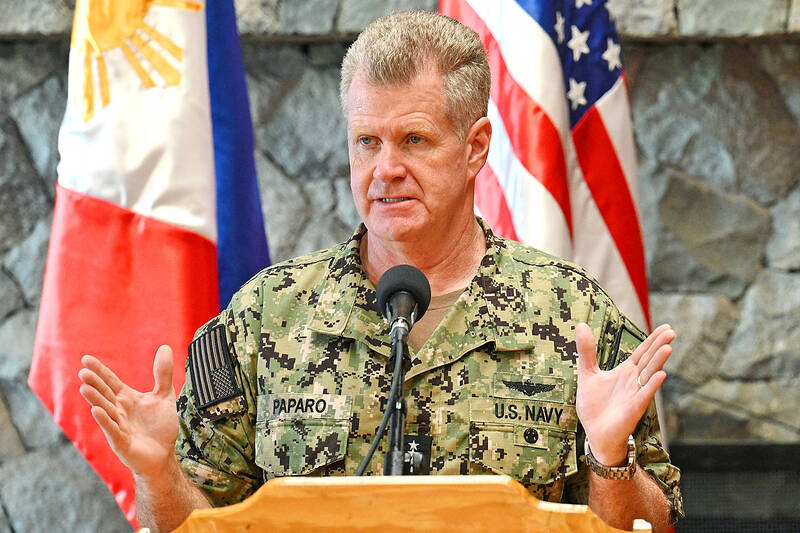US Indo-Pacific Commander Admiral Samuel Paparo said the US is confident it could defeat China in the Pacific, but that technical advantage is shrinking, the Washington Post reported yesterday.
Speaking at the Reagan Defense Forum on Saturday, Paparo said the US needs to maintain its technical lead over China by enhancing missile technology and building a communications network able to withstand hackers, the paper reported.
Although the US is able to hit long-distance and difficult targets with its advanced cruise missile system, each launch costs more than US$1 million, he said.

Photo: AFP
By contrast, drones, which are relatively cheap to build and develop, can be remotely controlled to fight on the front lines through a computer, he said.
Paparo also told the forum that Russia and North Korea had reached an agreement on Moscow providing fourth-generation Mikoyan MiG-29 and Sukhoi Su-27 fighter jets in exchange for Pyongyang sending troops to help in the fight against Ukraine, the report said.
Pyongyang, rather than Moscow, proposed sending North Korean troops to Ukraine, Paparo said, adding that the condition was set so that Pyongyang could also obtain ballistic missile re-
entry technology and submarine-related technology from Moscow.
In another forum organized by the Brookings Institution on Nov. 19, Paparo said that North Korea on Oct. 31 tested an intercontinental ballistic missile that reached an altitude of 7,000km.
“Even though Pyongyang continues to test long-range missiles with adequate range to reach the US ... the US has not yet seen evidence that North Korea has mastered the difficult task of building re-entry vehicles that could contain nuclear warheads, and that could withstand atmospheric resistance and heating when returning from space at a speed of 7km per second. This may help explain why the testing continues,” he said.
While some analysts have warned that China has caught up to the US military for scenarios involving Taiwan, and many US wargames predict that China would succeed in defeating the US and its allies, China would face difficult odds whether in a D-Day-style invasion or a more indirect coercive approach like a blockade, Paparo said.
Chinese President Xi Jinping (習近平) had given his military leaders the task of being ready to take Taiwan by 2027, even in the face of US military involvement, but it does not represent a decision to attack that year or any particular year, he said.
However, the US Indo-Pacific Command must be ready to help defend Taiwan even before 2027, and it should certainly plan on being prepared to defend Taiwan after that year as well, Paparo added.

DAREDEVIL: Honnold said it had always been a dream of his to climb Taipei 101, while a Netflix producer said the skyscraper was ‘a real icon of this country’ US climber Alex Honnold yesterday took on Taiwan’s tallest building, becoming the first person to scale Taipei 101 without a rope, harness or safety net. Hundreds of spectators gathered at the base of the 101-story skyscraper to watch Honnold, 40, embark on his daredevil feat, which was also broadcast live on Netflix. Dressed in a red T-shirt and yellow custom-made climbing shoes, Honnold swiftly moved up the southeast face of the glass and steel building. At one point, he stepped onto a platform midway up to wave down at fans and onlookers who were taking photos. People watching from inside

A Vietnamese migrant worker yesterday won NT$12 million (US$379,627) on a Lunar New Year scratch card in Kaohsiung as part of Taiwan Lottery Co’s (台灣彩券) “NT$12 Million Grand Fortune” (1200萬大吉利) game. The man was the first top-prize winner of the new game launched on Jan. 6 to mark the Lunar New Year. Three Vietnamese migrant workers visited a Taiwan Lottery shop on Xinyue Street in Kaohsiung’s Gangshan District (崗山), a store representative said. The player bought multiple tickets and, after winning nothing, held the final lottery ticket in one hand and rubbed the store’s statue of the Maitreya Buddha’s belly with the other,

‘COMMITTED TO DETERRENCE’: Washington would stand by its allies, but it can only help as much as countries help themselves, Raymond Greene said The US is committed to deterrence in the first island chain, but it should not bear the burden alone, as “freedom is not free,” American Institute in Taiwan Director Raymond Greene said in a speech at the Institute for National Defense and Security Research’s “Strengthening Resilience: Defense as the Engine of Development” seminar in Taipei yesterday. In the speech, titled “Investing Together and a Secure and Prosperous Future,” Greene highlighted the contributions of US President Donald Trump’s administration to Taiwan’s defense efforts, including the establishment of supply chains for drones and autonomous systems, offers of security assistance and the expansion of

Japan’s strategic alliance with the US would collapse if Tokyo were to turn away from a conflict in Taiwan, Japanese Prime Minister Sanae Takaichi said yesterday, but distanced herself from previous comments that suggested a possible military response in such an event. Takaichi expressed her latest views on a nationally broadcast TV program late on Monday, where an opposition party leader criticized her for igniting tensions with China with the earlier remarks. Ties between Japan and China have sunk to the worst level in years after Takaichi said in November that a hypothetical Chinese attack on Taiwan could bring about a Japanese